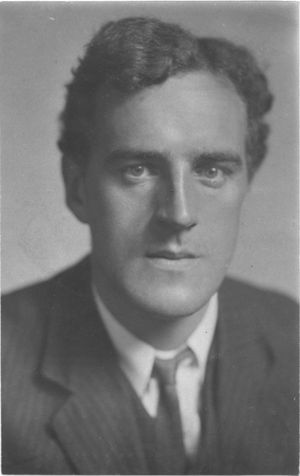Donald Struan Robertson, FBA
1885-1961. Regius Professor of Greek; Vice-Master.
Robertson was educated at Westminster School, begore winning a major entrance scholarship to Trinity, where he gained a double first in Classics. He won the Latin essay prize, the first chancellor's medal, and the Stewart of Rannoch, Pitt, and Charles Oldham scholarships. He was elected to a fellowship in 1909.
In the same year he married Petica Coursolles. Their first child, (Charles) Martin Robertson (1911-2004), was later professor of classical archaeology at Oxford; he was followed by Giles Henry Robertson (1913-1987), who became professor of fine art at Edinburgh.
In 1911 Robertson joined Ernest Harrison and Francis Cornford on the classical staff at Trinity, as assistant lecturer. On the outbreak of war, in spite of a slight congenital lameness, he was commissioned in the Royal Army Service Corps, in which he rose to the rank of major. He returned in 1919 to lecturing and supervising at Trinity, and in 1928 he succeeded A.C. Pearson as Regius Professor of Greek.
From the beginning archaeology and literature were the fields of classical scholarship that engaged Robertson's interest. His first lectures were on archaeology but after the war he turned to Greek literature; he took particular pleasure in his course on poetry from Homer to Aeschylus, which attracted large audiences. His delivery was rapid and his matter highly compressed, but he spoke with patent sincerity touched at times with eloquence, especially when Homer or Pindar was his subject. He also gave specialist courses both on literature and on textual criticism.
Robertson's first book was A Handbook of Greek and Roman Architecture (1929); perhaps his most important legacy is his text of the Metamorphoses of Apuleius, published in tthree volumes (1940-45). He spent many years over the collation of the manuscripts, whose relationship he established, and produced a greatly improved text accompanied by an apparatus criticus remarkable for its economy.
In 1941 Robertson suffered a stunning blow in the loss of his wife, who, while on duty as an air-raid warden, became the only person in Cambridge to be killed by a German bomb. He now moved from his house to rooms in College, and continued to take an active part in university affairs and in College administration, serving as Vice-Master from 1947 to 1951. But the shock of his wife's death seems to have been primarily responsible for his failure to complete the work on Pindar of which he had spoken in his inaugural lecture of 1929. He read widely in many languages, including Old Persian and Icelandic.
He was elected Fellow of the British Academy in 1940; he received honorary degrees from the universities of Durham, Glasgow, and Athens.
| Memorial inscription | Translation |
|
DONALD STRUAN ROBERTSON huius collegii per LII annos socius per IV |
Donald Struan Robertson was a Fellow of the College for fifty-two years, Vice-Master for four years, and Regius Professor of Greek. He studied many other languages for what they could contribute to humane studies. He was held in especial affection by the Fellows for his mild and kindly disposition. He died in 1961 at the age of seventy-six. |
Donald Struan RobertsonBrass located on the south wall of the Ante-Chapel. |
|
|
|
PREVIOUS BRASS |
|
NEXT BRASS John Arthur Thomas Robinson |
| Brasses A-B | Brasses C-G | Brasses H-K | Brasses L-P | Brasses R-S | Brasses T-W |


